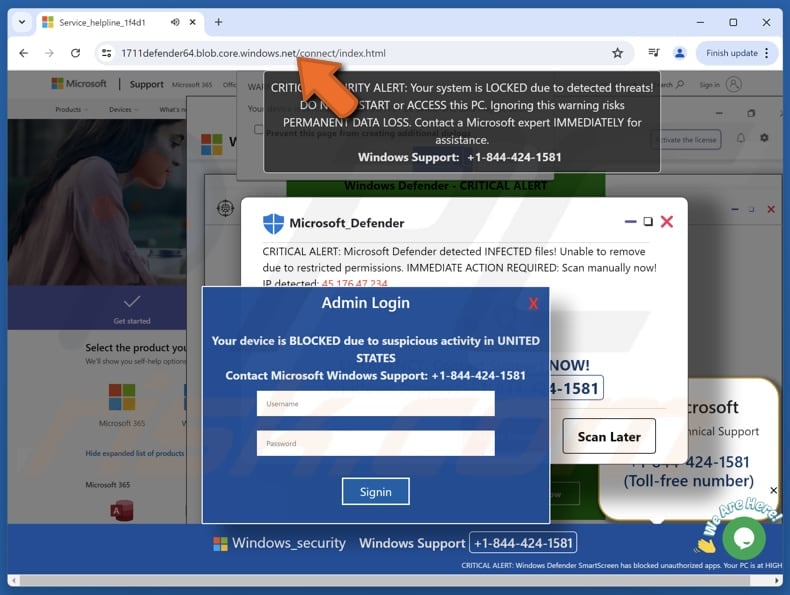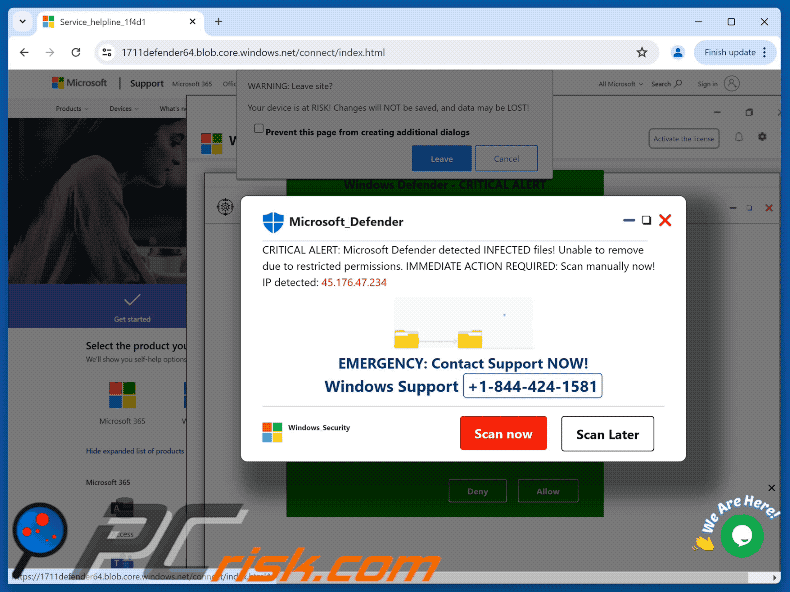How to spot scams like "Your System Is Locked Due To Detected Threats"
Phishing/ScamAlso Known As: Your System Is Locked Due To Detected Threats fake warning
Get free scan and check if your device is infected.
Remove it nowTo use full-featured product, you have to purchase a license for Combo Cleaner. Seven days free trial available. Combo Cleaner is owned and operated by RCS LT, the parent company of PCRisk.com.
What is "Your System Is Locked Due To Detected Threats"?
We have examined the site and concluded that it hosts a technical support scam. This scam involves fraudulent messages (fake system warnings and critical alerts) to trick visitors into calling a fake support number. It should be ignored to avoid issues like monetary loss, computer infections, or identity theft.

"Your System Is Locked Due To Detected Threats" scam in detail
The messages on this fraudulent website claim that the user's computer is infected and locked due to security threats. They warn about permanent data loss if no action is taken. The site directs users to contact a supposed Microsoft support number (+1-844-424-1581) for immediate assistance.
If contacted, scammers may try to extract personal information (e.g., login credentials, credit card details, or ID details) from users. They may also attempt to trick users into paying for fake or unnecessary products or services or downloading potentially malicious software.
Moreover, they may try to obtain remote access to computers using remote administration tools (examples of scams where fraudsters aim to achieve this are "TeamViewer" and "UltraViewer" scams). Overall, victims of such scams can have their identities, money, or personal accounts stolen.
Also, victims may unknowingly download malware or enable scammers to execute malware on devices. Thus, it is important to know how to recognize technical support scams and ignore them. Legitimate websites never display such messages and urge visitors to call technical support.
| Name | Your System Is Locked Due To Detected Threats fake warning |
| Threat Type | Phishing, Scam, Social Engineering, Fraud |
| Fake Claim | Computer is infected and locked |
| Disguise | Security alert |
| Tech Support Scammer Phone Number | +1-844-424-1581 |
| Related Domain | 1711defender64.blob.core.windows[.]net |
| Detection Names | Netcraft (Malicious), Full List Of Detections (VirusTotal) |
| Symptoms | Fake error messages, fake system warnings, pop-up errors, hoax computer scan. |
| Distribution methods | Compromised websites, rogue online pop-up ads, potentially unwanted applications. |
| Damage | Loss of sensitive private information, monetary loss, identity theft, possible malware infections. |
| Malware Removal (Windows) |
To eliminate possible malware infections, scan your computer with legitimate antivirus software. Our security researchers recommend using Combo Cleaner. Download Combo CleanerTo use full-featured product, you have to purchase a license for Combo Cleaner. 7 days free trial available. Combo Cleaner is owned and operated by RCS LT, the parent company of PCRisk.com. |
Conclusion
In general, this scam uses fake security alerts and urgent warnings to trick users into providing personal information or making payments. Scammers may also attempt to gain remote access or infect devices with malware. Such messages should be ignored, and users should never contact the numbers or follow the instructions provided.
Examples of similar scams are "Facebook Has Suspended Your Account", "Windows Defender Security Has Disabled Your Computer", and "We've Disabled Your Facebook Account".
How did I open a scam website?
Scammers use different methods to lure potential victims, including deceptive emails containing links (or files), misleading social media messages, and notifications from unreliable websites. Users can also be directed to scam sites through ads on questionable websites or pop-ups displayed by adware.
Furthermore, shady advertising networks can be used to promote scams. These networks are often used on platforms like torrent sites, adult content pages, and websites that stream pirated movies.
How to avoid visiting scam pages?
Users should not permit suspicious websites to show notifications and should not interact with ads, pop-ups, links, or buttons on such pages. Programs and files should only be downloaded from official sources or trusted app stores. Attachments or links in unexpected, irrelevant messages from unknown senders should be left unopened.
It is also crucial to keep the operating system and applications up to date and regularly scan the system using a reputable security tool. If your computer is already infected with unwanted apps, we recommend running a scan with Combo Cleaner Antivirus for Windows to automatically eliminate them.
The appearance of "Your System Is Locked Due To Detected Threats" pop-up scam (GIF):

Text in one of the fraudulent messages:
CRITICAL SECURITY ALERT: Your system is LOCKED due to detected threats!
DO NOT RESTART or ACCESS this PC. Ignoring this warning risks PERMANENT DATA LOSS. Contact a Microsoft expert IMMEDIATELY for assistance.
Windows Support: +1-844-424-1581
Instant automatic malware removal:
Manual threat removal might be a lengthy and complicated process that requires advanced IT skills. Combo Cleaner is a professional automatic malware removal tool that is recommended to get rid of malware. Download it by clicking the button below:
DOWNLOAD Combo CleanerBy downloading any software listed on this website you agree to our Privacy Policy and Terms of Use. To use full-featured product, you have to purchase a license for Combo Cleaner. 7 days free trial available. Combo Cleaner is owned and operated by RCS LT, the parent company of PCRisk.com.
Quick menu:
- What is Your System Is Locked Due To Detected Threats fake warning?
- How to identify a pop-up scam?
- How do pop-up scams work?
- How to remove fake pop-ups?
- How to prevent fake pop-ups?
- What to do if you fell for a pop-up scam?
How to identify a pop-up scam?
Pop-up windows with various fake messages are a common type of lures cybercriminals use. They collect sensitive personal data, trick Internet users into calling fake tech support numbers, subscribe to useless online services, invest in shady cryptocurrency schemes, etc.
While in the majority of cases these pop-ups don't infect users' devices with malware, they can cause direct monetary loss or could result in identity theft.
Cybercriminals strive to create their rogue pop-up windows to look trustworthy, however, scams typically have the following characteristics:
- Spelling mistakes and non-professional images - Closely inspect the information displayed in a pop-up. Spelling mistakes and unprofessional images could be a sign of a scam.
- Sense of urgency - Countdown timer with a couple of minutes on it, asking you to enter your personal information or subscribe to some online service.
- Statements that you won something - If you haven't participated in a lottery, online competition, etc., and you see a pop-up window stating that you won.
- Computer or mobile device scan - A pop-up window that scans your device and informs of detected issues - is undoubtedly a scam; webpages cannot perform such actions.
- Exclusivity - Pop-up windows stating that only you are given secret access to a financial scheme that can quickly make you rich.
Example of a pop-up scam:

How do pop-up scams work?
Cybercriminals and deceptive marketers usually use various advertising networks, search engine poisoning techniques, and shady websites to generate traffic to their pop-ups. Users land on their online lures after clicking on fake download buttons, using a torrent website, or simply clicking on an Internet search engine result.
Based on users' location and device information, they are presented with a scam pop-up. Lures presented in such pop-ups range from get-rich-quick schemes to fake virus scans.
How to remove fake pop-ups?
In most cases, pop-up scams do not infect users' devices with malware. If you encountered a scam pop-up, simply closing it should be enough. In some cases scam, pop-ups may be hard to close; in such cases - close your Internet browser and restart it.
In extremely rare cases, you might need to reset your Internet browser. For this, use our instructions explaining how to reset Internet browser settings.
How to prevent fake pop-ups?
To prevent seeing pop-up scams, you should visit only reputable websites. Torrent, Crack, free online movie streaming, YouTube video download, and other websites of similar reputation commonly redirect Internet users to pop-up scams.
To minimize the risk of encountering pop-up scams, you should keep your Internet browsers up-to-date and use reputable anti-malware application. For this purpose, we recommend Combo Cleaner Antivirus for Windows.
What to do if you fell for a pop-up scam?
This depends on the type of scam that you fell for. Most commonly, pop-up scams try to trick users into sending money, giving away personal information, or giving access to one's device.
- If you sent money to scammers: You should contact your financial institution and explain that you were scammed. If informed promptly, there's a chance to get your money back.
- If you gave away your personal information: You should change your passwords and enable two-factor authentication in all online services that you use. Visit Federal Trade Commission to report identity theft and get personalized recovery steps.
- If you let scammers connect to your device: You should scan your computer with reputable anti-malware (we recommend Combo Cleaner Antivirus for Windows) - cyber criminals could have planted trojans, keyloggers, and other malware, don't use your computer until removing possible threats.
- Help other Internet users: report Internet scams to Federal Trade Commission.
Frequently Asked Questions (FAQ)
What is a pop-up scam?
This type of scam usually involves a fraudulent message (e.g., a system warning or a virus alert) that appears on a deceptive website. It is designed to trick visitors into contacting scammers or taking other actions.
What is the purpose of a pop-up scam?
Scammers employ these schemes to steal money by convincing users to pay for fake or unnecessary services or products, to collect sensitive personal information, or to deliver malware.
Why do I encounter fake pop-ups?
Scammers often spread scams through fake emails, misleading social media messages, alerts from untrustworthy websites, ads on dubious sites, pop-ups from adware, and shady advertising networks (often found on torrent, adult, or similar sites).
Will Combo Cleaner protect me from pop-up scams?
Combo Cleaner checks the websites and identifies those that pose a threat. It recognizes pop-up scam sites, issues instant alerts, and prevents users from accessing them.
Share:

Tomas Meskauskas
Expert security researcher, professional malware analyst
I am passionate about computer security and technology. I have an experience of over 10 years working in various companies related to computer technical issue solving and Internet security. I have been working as an author and editor for pcrisk.com since 2010. Follow me on Twitter and LinkedIn to stay informed about the latest online security threats.
PCrisk security portal is brought by a company RCS LT.
Joined forces of security researchers help educate computer users about the latest online security threats. More information about the company RCS LT.
Our malware removal guides are free. However, if you want to support us you can send us a donation.
DonatePCrisk security portal is brought by a company RCS LT.
Joined forces of security researchers help educate computer users about the latest online security threats. More information about the company RCS LT.
Our malware removal guides are free. However, if you want to support us you can send us a donation.
Donate
▼ Show Discussion